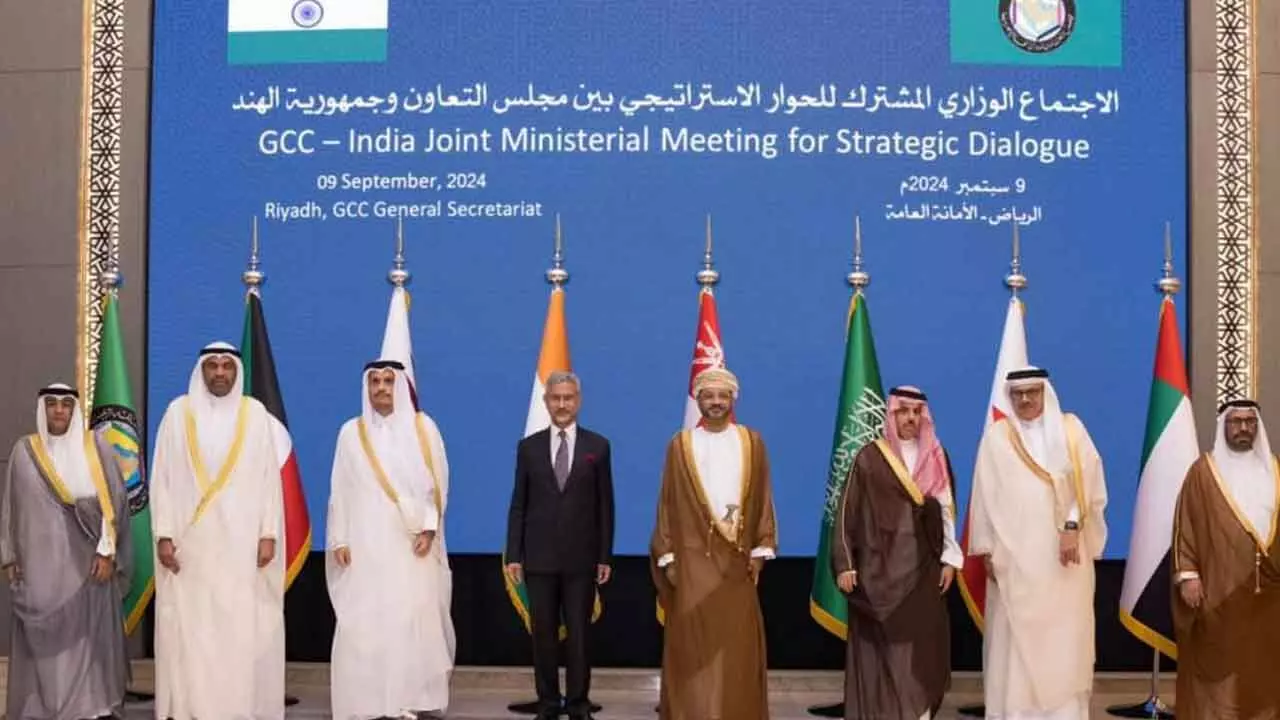India-Gulf Strategic Cooperation Can Effectively Address Global And Regional Dynamics
Trade and energy cooperation have been two traditionally dominant areas of cooperation between the two
India-Gulf Strategic Cooperation Can Effectively Address Global And Regional Dynamics

While historically the Indian Navy has been at the forefront of the military-to-military interactions with its counterparts in Gulf countries, recent years have seen armies, air forces and coast guards actively participating in joint exercises and training activities
The strategic elevation of India-Kuwait relations signifies a transformative phase in Indo-Gulf Relations, leveraging centuries-old ties to address contemporary challenges and opportunities.
By focusing on energy, trade, defence and technology, India and the Gulf can unlock their full potential while addressing global and regional dynamics. Strengthening people-to-people ties and embracing shared development goals will ensure long-term sustainability in their partnership.
Earlier this year, India and the Gulf Cooperation Council (GCC) adopted a Joint Action Plan for 2024-2028 to facilitate joint ventures in various sectors including energy, trade, security, agriculture, health, and food security. External Affairs Minister (EAM) S. Jaishankar, co-chairing the inaugural India-GCC Joint Ministerial Meeting for Strategic Dialogue at Riyadh with Qatar’s Prime Minister and Minister of Foreign Affairs Sheikh Mohammed bin Abdulrahman, highlighted the critical importance of cooperation with the GCC for India.
Trade and energy cooperation have been two traditionally dominant areas of cooperation between India and the Gulf region. Bilateral trade and commerce are increasing significantly, and currently, the UAE and Saudi Arabia rank among India's top trading partners with bilateral trade of US$ 84.4 billion and US$ 52.7 billion respectively. This underscores the depth of India’s economic engagement with the region.
India is heavily dependent on the Gulf region for its energy supply. The region supplies around two-thirds of India’s energy requirements. While Iraq, Saudi Arabia and the UAE remain the important sources of crude oil, Qatar is the major source of LNG.
Gulf countries also play a crucial role in India’s Strategic Petroleum Reserve (SPR). Moving beyond the buyer-seller relationship, India has engaged in building strategic partnerships and investments in the energy sector in the Gulf. Indian companies are involved in oil exploration, production and pipeline projects in the region. Thus, in the field of energy cooperation, it is building strategic partnerships moving beyond the traditional buyer-seller relationship.
In recent years, India’s relationship with the Gulf countries has started moving beyond these two traditional domains of interaction. A notable feature of the engagement with the region is the growing engagement on defence and security issues. Collaborative endeavours such as joint military exercises and training initiatives have played a key role in the military-to-military interactions between the two. While historically the Indian Navy has been at the forefront of the military-to-military interactions with its counterparts in Gulf countries, recent years have seen armies, air forces and coast guards actively participating in joint exercises and training activities.
There is a concern about the possibility of a duopoly in the Indian market. IATA opines that there is a sufficient chance for competition and growth, especially as new airports are being developed. Making sure that air traffic and airport infrastructure keep pace with this expansion will be a critical factor. In this context, India’s commitment to building new airports and investing in infrastructure are the right steps.
Regarding the concern about the possibility of a duopoly in the Indian market, Walsh commented that there is a sufficient chance for competition and growth, especially as the new airports are being developed.
‘’I wouldn’t term it a duopoly. With the evolving market dynamics, India’s aviation sector is set for thrilling growth,’’ he remarked.
On airport charges, Walsh noted positive developments in economic regulations for airports and asserted that ownership will not decide the success or failure of an airport.
With energy security at the heart of their discussions, India and Kuwait are not only addressing current needs but also preparing for a sustainable future. As both countries continue to deepen their ties, their collaboration will likely serve as a model for the wider India-GCC partnership, fostering greater regional cooperation and contributing to global economic and environmental goals.
The India-GCC Joint Action Plan 2024-2028 marks a significant milestone in India’s West Asia policy, reinforcing its commitment to deepening ties with the Gulf region.
The partnership’s emphasis on energy security, trade, food security, and innovation aligns with India’s long-term strategic goals.
As India seeks to diversify its energy sources, enhance its trade relations and address global challenges such as climate change, risks to food supply chains and political instability, its collaborative ventures with the GCC offer immense potential.
By fostering cooperation in emerging areas, India is poised to play a pivotal role in championing progress and prosperity–not only in India, but also in West Asia altogether.
The India-GCC dynamic will not only bolster India’s influential position in geopolitics but also contribute to its broader vision of sustainable development and regional peace.

